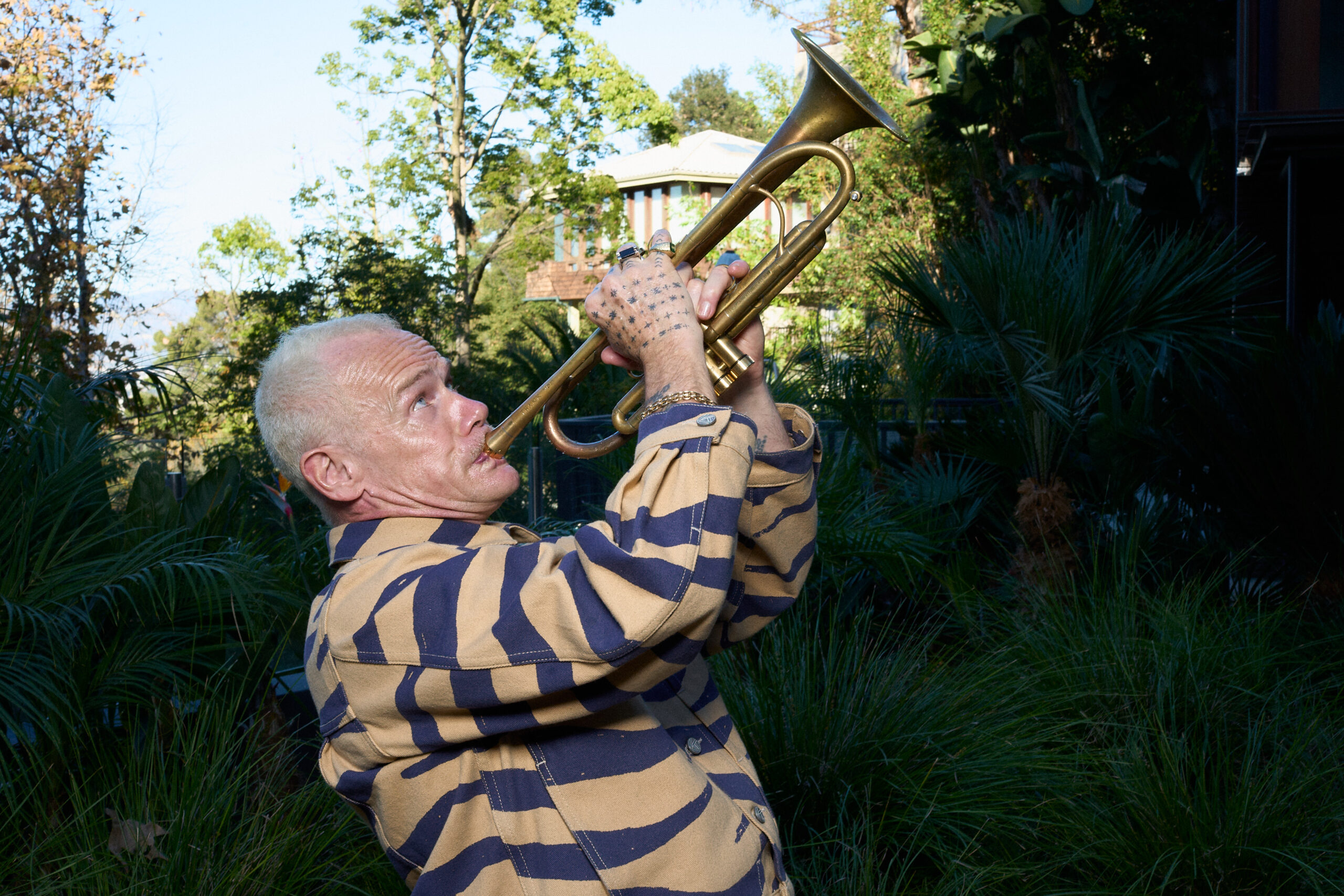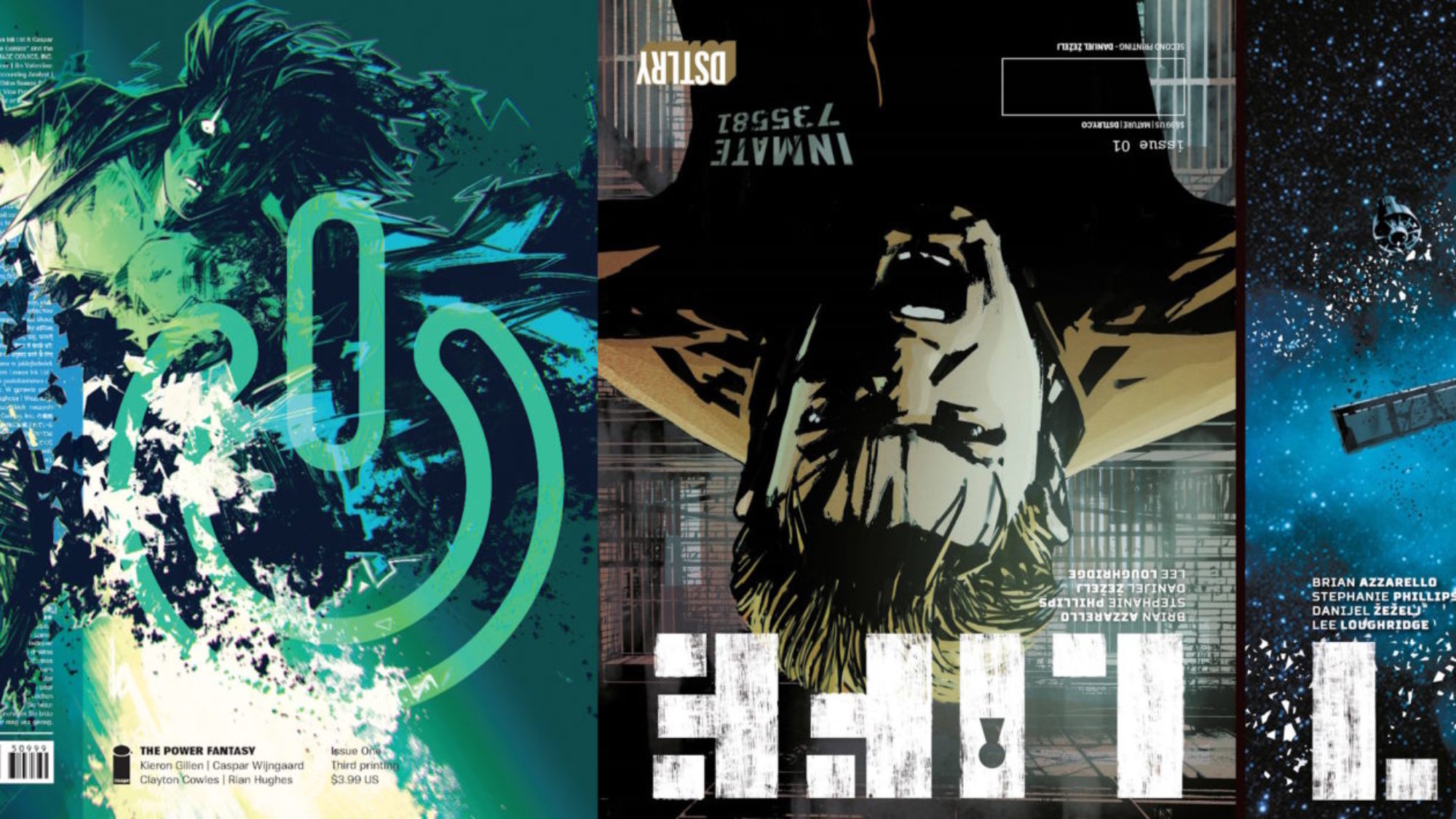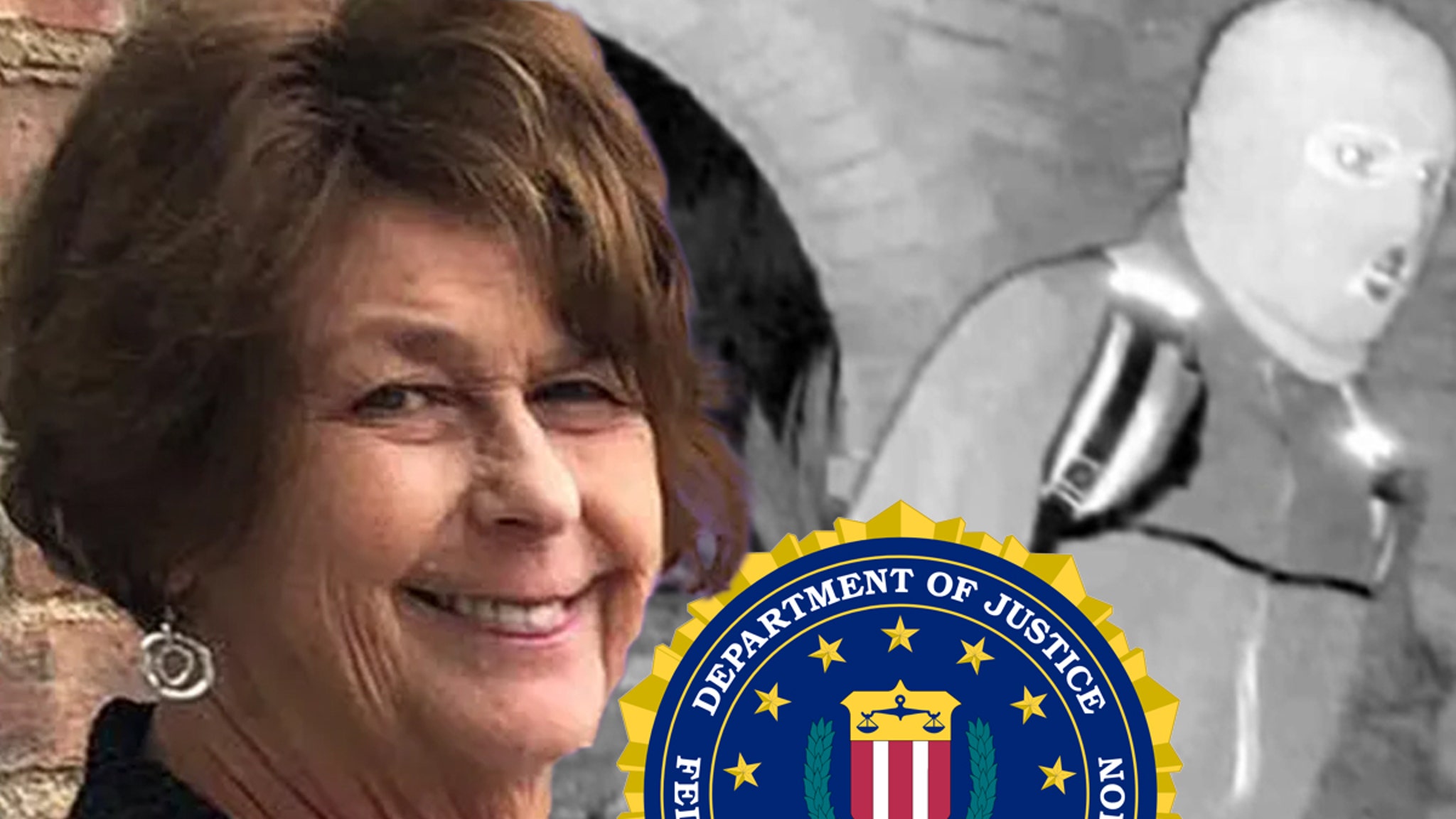Malice K appears in our Fall 2024 Issue with cover stars Slipknot, Destroy Boys, Pierce the Veil, and beabadoobee. Head to the AP Shop to grab a copy.
“Are you spiritual?” I shout over a worn table in the corner of Spring Lounge. This moment sounds like an early aughts comedy, and this is the “bad date” scene. The truth is, I’ve been sitting here attempting to understand Alex Konschuh, otherwise known as the artist Malice K, for over two hours, nursing a Diet Coke. While we’ve chatted, the 1920s dive bar, whose motto is “Life is short, drink early,” has filled with a rowdy but jovial gang of local characters. It’s 4 in the afternoon, well liquors are sloshing, and it’s gotten noisier, so Konschuh and I have been playing musical chairs in an attempt to get a clear recording. During this dance, while dodging eccentric patrons, the standoffish Washington-born artist who first sat down beside me began to crack wide open, leaving just enough room for me to probe further, and ask about God, self-confidence, and the future.
Within the first 10 minutes of our meeting, Konschuh let me know his trepidation about talking to me: “We don’t even know each other.” An astute observation, which he follows up by telling me where he won’t go this afternoon — where he’s been before. “In interviews, when I’ve been asked about DEATHPROOF INC., or the first music I heard, I’m just like, ‘That’s so long ago.’ I feel like I’m almost having to make up something because I actually don’t remember.” They’re honest boundaries that I can appreciate. No industry icebreakers, no interviews he’s done before. So I buy him a Tito’s soda and release any chokehold on formality. We focus on the present — there’s certainly enough material there.
Read more: nascar aloe has a whole lot left to say
In Spring Lounge that day, Malice K’s debut album, AVANTI, is just weeks from release. We dig into the music a bit, but our narrative drifts into more the personal realm, and soon we’re unlocking a plethora of good, bad, and ugly, much of which we share in common — a love for music often clouded by the industry of it all, a head full of fear and darkness about the future, an appreciation for Shirley Bassey, and the need to practice radical acceptance in the face of it all. After we close out, I walk home with his new album in my headphones, and I feel connected to the work that had moved me from the start, in new ways. The conversation may not have delved into his guitar of choice or writing and recording process, where he gets “inspiration” or which favorite records he cut his teeth on — but somewhere in our rambling comparison of scars, Konschuh delivered his own deep dive on AVANTI, and it was one far heavier and more informative of the music than any Q&A could have provided.
It’s not an easy feat to describe Malice K’s sound in 2D. His work is simple, matter of fact, while incredibly complex. He’s been tritely dubbed by many the “Elliott Smith of our generation,” but while there’s a whiff of the late Smith in some of his songs, reducing what Malice K has done down to such a smooth comparison feels ignorant. His melancholy, folk-rock vocals and wavering reverb are only one facet layer of the idiosyncratic, multitudinous onion that is not only AVANTI, but the EPs and tracks Malice K has thrown at us before. Listening through the album, again and again, I filled pages of notes with what I heard — trying to uncover reference points, decipher the artist’s code, and be able to find the right descriptor that would fit neatly in a sentence. But Malice K, armed with an acoustic guitar, is anything but neat.
From the simplicity of classic punk-rock sounds that range from Lou Reed to the more recent echoes of Against Me!, Malice K tumbles toward more intricate chord progressions, recalling Nirvana’s more Beatles-inspired work. At other times, the artist wields his ax with a sound, and attitude, not unlike Jonathan Richman in the early days of the Modern Lovers. All the while, his lawless sonic landscape is built upon an intensity that’s been imparted as lavishly on his live sets — sweaty, raucous events that edge into strip tease territory, in true Iggy Pop form. In Malice K’s unique form of organized chaos, which my scribblings of Prodigy, second-wave emo, and Jim Croce got nowhere near unlocking — one thing rings true and clear. Konschuh is about authenticity — AVANTI itself is as blunt, brilliant, and at times uncomfortable as the young man stretching his long legs and pointed-toe boots across the bar floor beside me. It’s deep in the sound, and it’s certainly there for the taking in the songs themselves.
On AVANTI’s “Radio,” the artist sings, “My life’s a cup one drop away from spilling over.” It reminds me of a moment, about a decade ago. I was in a dark place (namely, my early 20s), moping around the East Village when a man tapped my shoulder and asked, “Is the glass half-empty or half-full?” With an eye roll, I turned away from him and sighed, “Half-empty!” But as I shook the stranger off, he called after me, “The ice caps are melting. You can fill ’er up!” Like the Malice K lyric, the enigmatic, tactile phrase didn’t let me go. Later I found out that cups in the Tarot deck represent emotional consciousness, tying into the parable at hand. The good can’t be without the bad; nothing is just one-sided. As much as emotional bankruptcy, mirth of happiness and success come with a risk and at a price. For Konschuh, the proverbial cup may have started full, but just as much fear, anxiety, and disappointment can allude us when goals and dreams come true. If you’re not armed with acceptance and gratitude, the looming idea of uncertainty, Konschuh and I uncovered, is debilitating. Into what realm do dreams cross over once they’re achieved — is it closer to heaven, purgatory, or hell? These thoughts have been injected into the stirring album, and have been a throughline over the last couple of years for Konschuh, ever since his trajectory turned upward.


Having left Washington state for Los Angeles, only to traverse the country for New York to sign to a label, Konschuh is no stranger to chasing dreams — or to achieving them. It’s a remarkable thing. The experience and expansion of the world around him is what ultimately lead us to this slimy saloon in celebration of a profoundly special album, a career triumph in its own right. It has also inherently shifted his understanding of the industry, his relationship to music, and to the artists he’d idolized as a kid growing up in Olympia. As Konschuh deems it, somewhere along the way, he’s lost his sense of “naivety.” Though it’s neither good nor bad, there’s a heartbreaking element to the idea, and that feeling of haunting nostalgia and the ghosts of our past plays a major role in AVANTI, which is not only the album title, but also the word for “forward” in Italian. It’s a breadcrumb trail that can be followed through each of the 11 tracks.
Before our first table hop, I ask him if there was a songwriter he felt especially drawn to. Konschuh’s lyricism is strikingly whip-smart and beautifully simple, like a twisted American songbook that’s been saturated with drugs, sex, and rock ’n’ roll. “It’s so hard to put someone above another person. But there’s one song that struck me the most lately,” he says while shaking the ice in his glass. “‘Diamonds Are Forever’ by Shirley Bassey. It’s just a great song around this metaphor of diamonds, material things, lasting longer than relationships. I was listening to it, and I was getting chills.”
Konschuh then scrunches his face, wheels turning on the question still. “I might have been able to have one easy answer a couple of years ago, but since I’ve started pursuing a musical career — not being in the same esteem as a lot of my idols, but kind of being in a similar situation — seeing the business and how much goes into it, how it’s changed so much, I don’t really romanticize music in the way I did before. I [used to] really think of it as the best thing in the world, if that makes sense. Now, I don’t feel as strongly about that. It’s weird. Music is something that I listen to and I like it, or I don’t. I don’t know.”
This isn’t a diatribe in our conversation, but rather, the tip of the iceberg, as it is in many others I have with artists and industry folk alike. Though not many are as frank as Konschuh — and it’s a refreshing quality that comes up again throughout our afternoon. “Since I went out chasing these dreams made out of sand/That are falling out through my hand,” Malice K sing-songs on his track “The Old House.” It strikes like a gut punch. He has a way of saying things that lie in the darkest recesses of my Prozac-logged brain, with candor and earnestness. It’s a moving characteristic, especially when put to zig-zagging music, that you can all imbibe in just as fruitfully from the privacy of your own headphones by dousing yourself in the moody maze of AVANTI. Song by song, the cup of Malice K’s life, teetering from half-full to half-empty, bone dry to running over, drips and clinks to keep the beat.
But though he sees reality in the harsh light of day, Konschuh knows not to teeter on the edge. “Yeah, I feel pretty… jaded is maybe the word. I’ll hear a song or I’ll hear a song in a show or a movie, and I’ll be like, ‘Oh, they have like a great license for that song.’ Or like, ‘They did a great job with the publishing.’ My love for music just slowly started being defined by other things. I guess it makes me a little bit sad, but at the end of the day I think it’s better to feel jaded about something because your dreams became your career. It’s better that way than being like, ‘Oh, I’m regretful.’ Or you hate that side of it, so you’re like, ‘Fuck music because it fucked me over.’”
AVANTI’s album art is also a Malice K original. The cover features a deep red, heart-shaped cushion, and, like a voodoo doll, it’s been slashed and sewn back together. There are pins and tiny daggers piercing its soft flesh. But it’s less satanic and more evocative of real, lived pain, the remaining scars and fear that lingers. Though Konschuh avoids any “themes” or narratives in a body of work, owning a specific distaste for concept albums — “except for maybe classical music, like Chopin,” he tells me of the new LP, “AVANTI is just moments of my life. The closest thing to a theme with the project is the album cover because it represents all the songs. And the title of the album, it’s like an umbrella for the whole project itself.”


On AVANTI, he rakes through the graveyard of his memories, performing sonic surgery on a nostalgia-ridden, lovesick, and tortured brain. The love songs are all yearning, writhing, regretting, and nodding out. “I’m someone who moves at the speed of pain,” I tell Alex, as we dig through what’s been uncovered — and he perks up. “Yeah. That’s a really good one.” The artist, on and off record, is simply listening to his gut — a feat that is far from easy in practice. “It’s just trying to follow that feeling and just caring about it,” he says. “Some of my emotions that are most important to me or deserve the most attention will sometimes be really what they are. They might present themselves, and I’m available to that. Through that usually, I’ll get some ideas, try to take risks, or try to do things that I wouldn’t usually do.”
But when it comes to his craft, and at times said emotions, Konschuh can be exceptionally hard on himself. It’s a mentality that bleeds out into his world outside the project. “My life? It’s a perpetual comedy event… I’m very concerned about failure,” he shares. “A lot of my work is just very consistent. It’s not like big things are happening. I have to sign papers and do the contract thing, which is all very unfamiliar to me… It feels like I’m keeping my head above water. But at the end of the day, it’s not a bad place. But then again, I’m just losing my mind. There’s no map or guarantee of success at all. I’ve got to actually depend on myself.” Pouring this sentiment into the new track, “Hold Me Up,” he croons out, “I’ve been living my life seven days a week/And it’s difficult/In a way that I don’t know why.”
Though the future is unknown, the industry has challenged the sparkle in his eye, and there’s the gnawing anxiety of an upcoming album release, it appears Konschuh is trying to take his album title to heart, and to make use of the cathartic open-heartedness it holds. “Now, I’m just doing whatever makes sense to me. At the end of the day, I’m like, ‘OK, it’s fine.’ I don’t worry. I make a living. And I sleep in. I have a very entitled life, so I’m like, ‘Whatever.’ I may be a guitarist, but whatever happens, happens… I’ve been patient for two years, so I just try not to worry.”

















